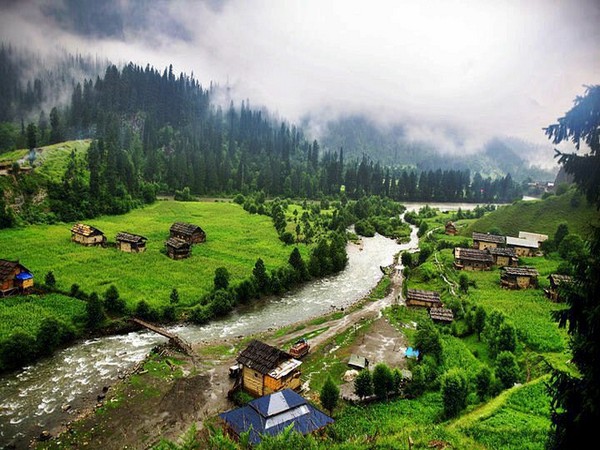
Srinagar (Jammu and Kashmir) [India], July 31 (ANI): Following the historic abrogation of Article 370, Jammu and Kashmir has undergone a remarkable transformation across diverse sectors, paving the way for new opportunities and growth. The region’s educational institutions have remained operational without any disruptions, and the availability of seamless internet services has acted as a catalyst for the expansion of digital businesses.
Tourist footfall has surged in various areas, with border tourism gaining immense popularity, drawing visitors from across the country. As we explore the multifaceted impact of these changes, we sit down with local residents and business owners, who share their experiences and insights into the region’s post-Article 370 era.
The seamless functioning of educational institutes has been one of the most significant positive outcomes of the post-Article 370 transformation. Despite the challenges during the transition, schools and colleges have remained open, providing students with a stable and uninterrupted learning environment.
Ajaz Ahmad government school teacher in Srinagar, expressed his enthusiasm for the opportunities it brought. “Our commitment to education remained unwavering during the transition period,” he said. “The resilience shown by our students and staff was commendable. We are witnessing a renewed passion for learning and academic growth among the youth,” he said.
Mohammad Ismail another teacher said that the continuity of education has not only instilled hope among the students but has also provided them with a platform to thrive and pursue their aspirations.
The seamless operation of internet services has served as a catalyst for the growth of digital businesses in the region. Startups and entrepreneurs have capitalized on the newfound opportunities, bolstering the region’s economy.
Aisha Khan, a young entrepreneur from Jammu, launched her online fashion boutique during this period. “The availability of seamless internet services has been a game-changer,” she explained. “It has empowered us to reach customers across the country and has opened up markets that were previously out of reach.”
The flourishing of digital businesses is a testament to the region’s potential and its readiness to embrace the digital age. Tourism in Jammu and Kashmir has transcended its traditional boundaries, with border tourism gaining immense popularity. Visitors from different parts of the country are now drawn to the enchanting hooting and waving exchanges between tourists on both sides of the Line of Control (LOC). Rahul Verma, a tourist from Delhi, shared his experience. “The camaraderie and warmth exchanged between visitors from different countries is truly unique,” he said. “It’s heartwarming to see the borders dissolve, even if just for a moment, and witness the sense of unity that transcends boundaries.”
The emergence of border tourism has opened doors for cultural exchange and understanding, fostering a more inclusive and connected world. To gain a deeper understanding of the transformation, we spoke with local residents and business owners, who have witnessed the changes firsthand.
Suhail Ahmad, a home stay owner in Keran, expressed his gratitude for the positive impact on the region. “Tourism has not only improved our livelihoods but also brought cultural exchange and understanding,” he said. “We are dedicated to continuously improving our blessed region, ensuring the safety and security of tourists while sharing the rich history of our land.”
Firdous Ahmad, a shopkeeper in Srinagar, highlighted the economic growth spurred by the increased tourist footfall. “The influx of tourists has breathed new life into our businesses,” he said. “We have witnessed a surge in demand for locally-made handicrafts and souvenirs, showcasing our culture and heritage to the world.”
As the region embraces the opportunities and challenges of the post-Article 370 era, it is evident that a new dawn has emerged in Jammu and Kashmir. The resilience shown by its people, the flourishing businesses, and the rise of border tourism all paint a picture of a region ready to flourish on its own terms.
The transformation has laid the groundwork for a brighter future, fostering unity, prosperity, and inclusivity. As the sun rises on this new day, Jammu and Kashmir is ready to embrace the limitless potential that lies ahead. The number of organised stone pelting incidents, associated with terrorism-separatist motives, which were at 1,767 in 2018, has reached zero in 2023. Similarly, there were 52 cases of organized bandh/hartal in 2018, but it has also dropped to zero in 2023. The home ministry’s affidavit highlights that decisive anti-terror measures have led to the dismantling of the terror eco-system, resulting in a significant decline in terrorist recruitment from 199 in 2018 to 12 in 2023.
Meanwhile, Lieutenant Governor Manoj Sinha recently said that the union is witnessing a new era of peace and development.
He also said the efforts to revive J-K’s bond with the film industry. “Significant steps like film policy and opening of cinema halls in the districts have created a vibrant film ecosystem in J-K,” the LG had said. J-K has become the most preferred destination for filmmakers and more than 300 movies and web series were filmed last year. This is also providing huge opportunities to the local youth,” he added.
Earlier this year Sinha invited business leaders from the United Arab Emirates to become partners in development and move together towards creating a more prosperous, equitable and vibrant Union Territory
He had addressed the India-UAE Investment Summit and interacted with the business delegates from the UAE and across the country at the SKICC. The successful holding of the recent meeting of the G20, the world’s largest economies, in Srinagar earlier this year has also brought Kashmir on the global tourism map as there has been a significant increase in inquiries and bookings from foreign tourists. (ANI)

















